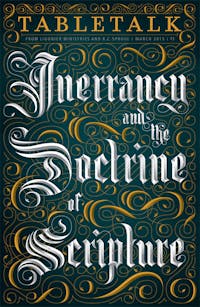
Request your free, three-month trial to Tabletalk magazine. You’ll receive the print issue monthly and gain immediate digital access to decades of archives. This trial is risk-free. No credit card required.
Try Tabletalk NowAlready receive Tabletalk magazine every month?
Verify your email address to gain unlimited access.
There’s something odd about the West’s shift from modernism to postmodernism. On the one hand, we would be wise to remember that the two are kin to each other. We can debate over whether they are father and son, older brother and younger, but no one can deny the family resemblance. Both worldviews share a fundamental common conviction: the Bible is not true. On the other hand, whatever the family relationship, this is not a happy and peaceful family. While both systems affirm that the Bible is not true, they diverge as to their reasons why. Modernism tells us the Bible is not true because science is true, and the Bible is not science. Postmodernism tells us that the Bible is not true because there is no truth, because nothing is true.
Because of the similarities, it is all too easy to confuse the two perspectives. Because of the differences, it is vitally important not to do so. A modernist assault on the authority and trustworthiness of the Bible is radically different from a postmodern assault. The former is a direct attack, a blitzkrieg to the very heart of our defenses. God says He made man out of the dust of the ground; the modernist tells us this is false—man evolved from lower life forms. When dealing with the modernist, we can expose his false assumptions, challenge his affirmations, provide evidence for the truthfulness of God’s Word. We can marshal archeological studies, march through propositions, all while raining cannon fire on the foundations of his strongholds.
The postmodernist, however, is far more subtle, crafty, slick. By flying the false flag of truce, offering a gentlemen’s agreement that we can all agree that none of us is right and none of us wrong, he requires that we lower our banner of truth. He turns straightforward affirmations and truth claims into weaselly, slippery internal matters of the heart. He judges a given statement not on the basis of its accuracy but its emotional potency—”How does that statement make you feel?”
Forty years ago, at least in the church, we were still facing the fading dinosaurs. Angry men denounced the accounts of miracles as primitive ignorance. Through the faithful work of the International Council on Biblical Inerrancy, however, the inerrancy of Scripture was maintained and championed. From a sheer numbers perspective, the “Battle for the Bible” was a rout and evangelicalism stood firm, and mainline churches and institutions bled members and lost influence.
The serpent, however, is both crafty and persistent. His current assault on the inerrancy of the Bible is more postmodern and therefore more indirect. Now we have people who try to affirm their belief in inerrancy while teaching that the Bible accommodated its message to its audience, that the Bible affirms things that we now know are not true. We have people who try to arm their belief in inerrancy while teaching that what we thought were historical narratives are actually myths. We have people who affirm inerrancy but go on to affirm that we should correct the sexism Paul imbibed from his surrounding culture.
In short, we have people who affirm both that the Bible is inerrant and that it, or at least some of it, is not to be believed. The serpent’s goal from the beginning has been to get us to doubt God’s Word. That he changes the weapons he uses doesn’t mean he’s changed his aim.
This highlights the real issue. Yes, inerrancy as a doctrine is vital. Certainly, inerrancy as an apologetic defense is critical. But ultimately, winning or losing the Battle for the Bible rests here: Do we believe God? That, above all, is what we need—to believe God. Our calling is to believe everything He has said, to believe it in our minds, in our hearts, and out through our fingertips. We are called to ever and always give our humble but exuberant amen to His every word. We are not merely to affirm the truthfulness of His Word in general but are called to submit to His Word at every particular. We are, in short, to seek first His kingdom and His righteousness.
We seek His kingdom best as we hear His voice most. That is just what the Bible is—the vox Dei, the “voice of God.” We are not to worry about our respectability or our reputations, but rather are to be focused on the one needful thing—His direction in His Word. We seek His righteousness as we submit to His law. When it is unfashionable, we submit to His law. When it is difficult, we submit to His law. When it swims against the cultural stream, we submit to His law.
In the end, inerrancy is less about our conclusion about the Bible and more about our submission to the Bible. We do not stand above it in judgment, even when we give it a perfect grade. Instead, it stands above us in judgment. And, to His everlasting glory, it gives those in Christ a perfect grade, despite our pride, our folly, our disobedience. For we are in Him, who is the Word of God incarnate, without error, and without blemish. His Word can no more err than He, the Word, can err. We are in ourselves liars. He is in Himself true.
